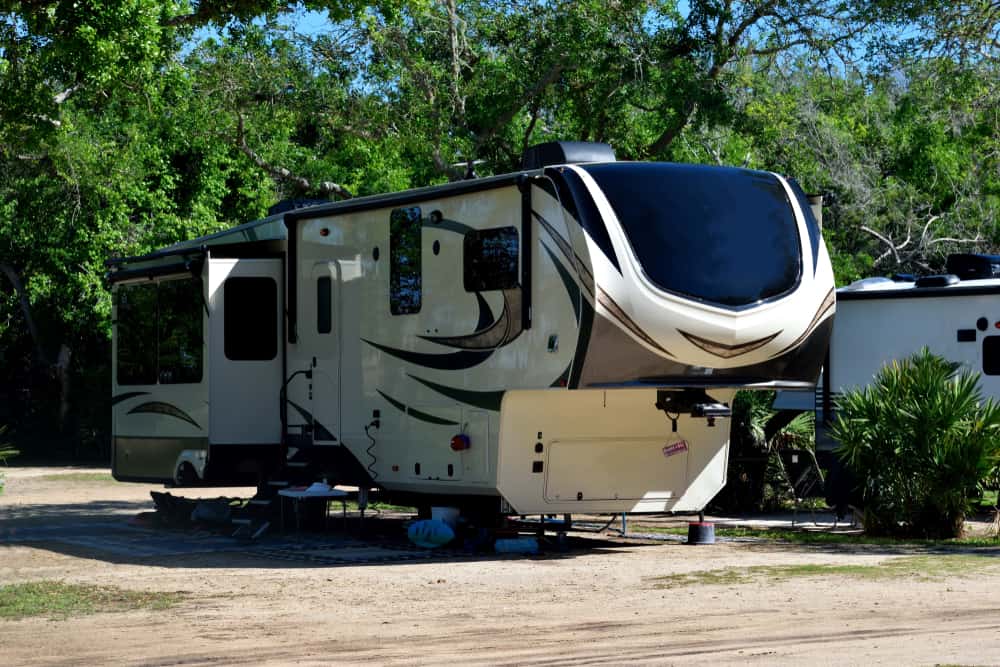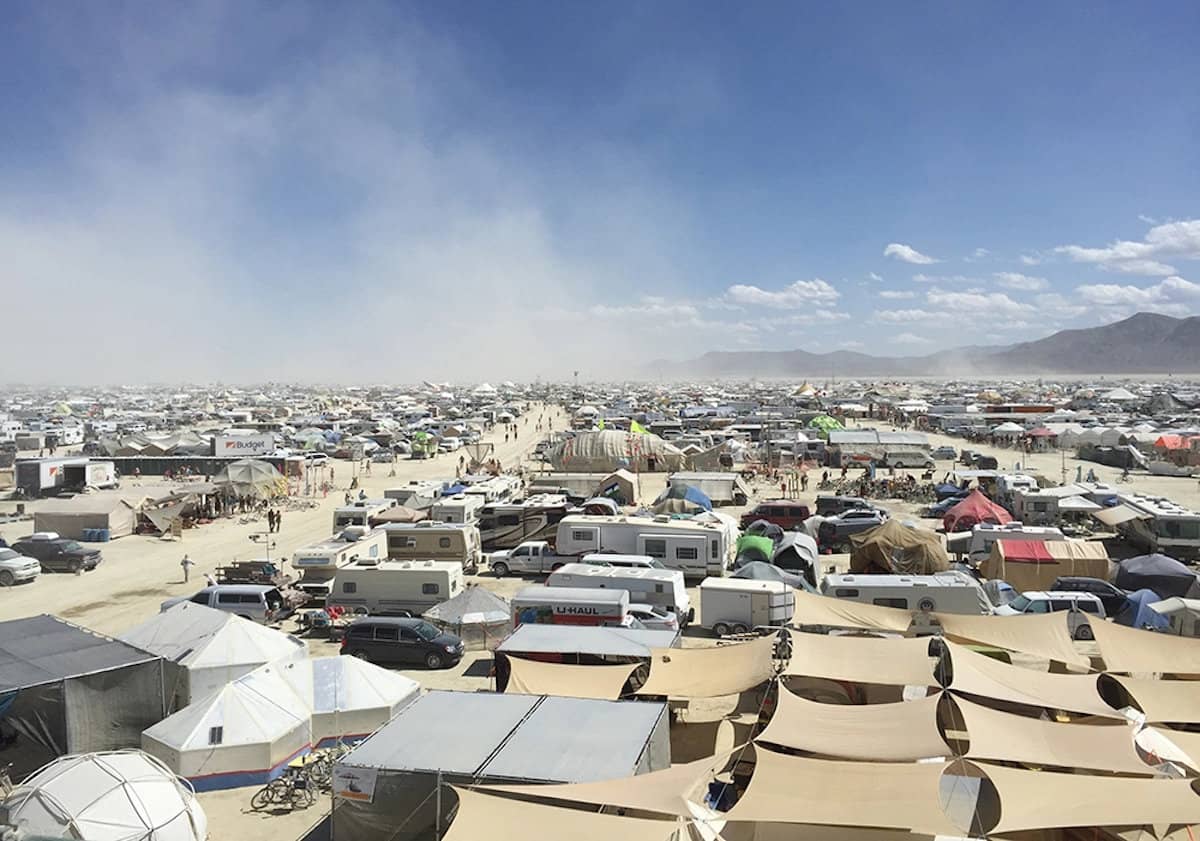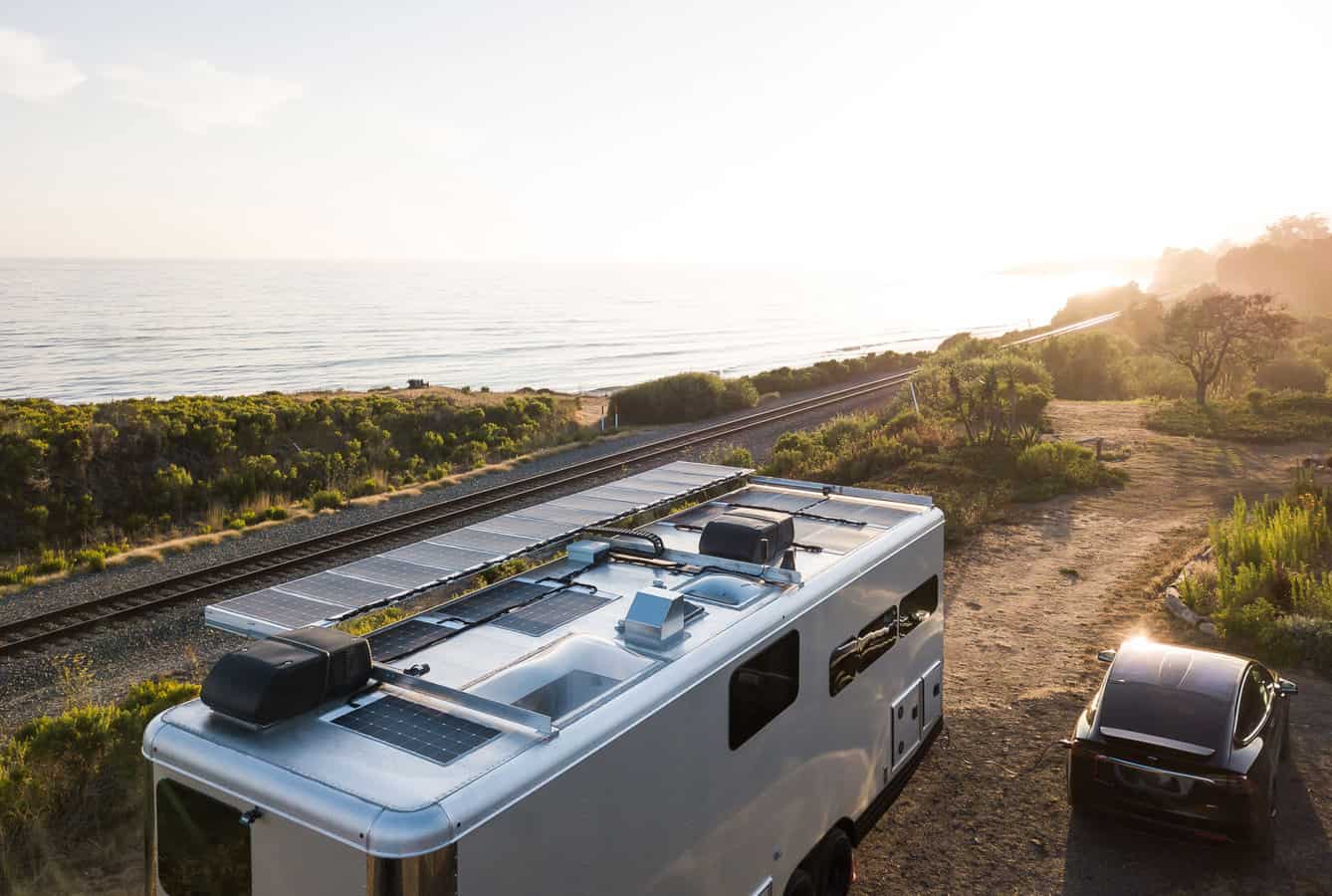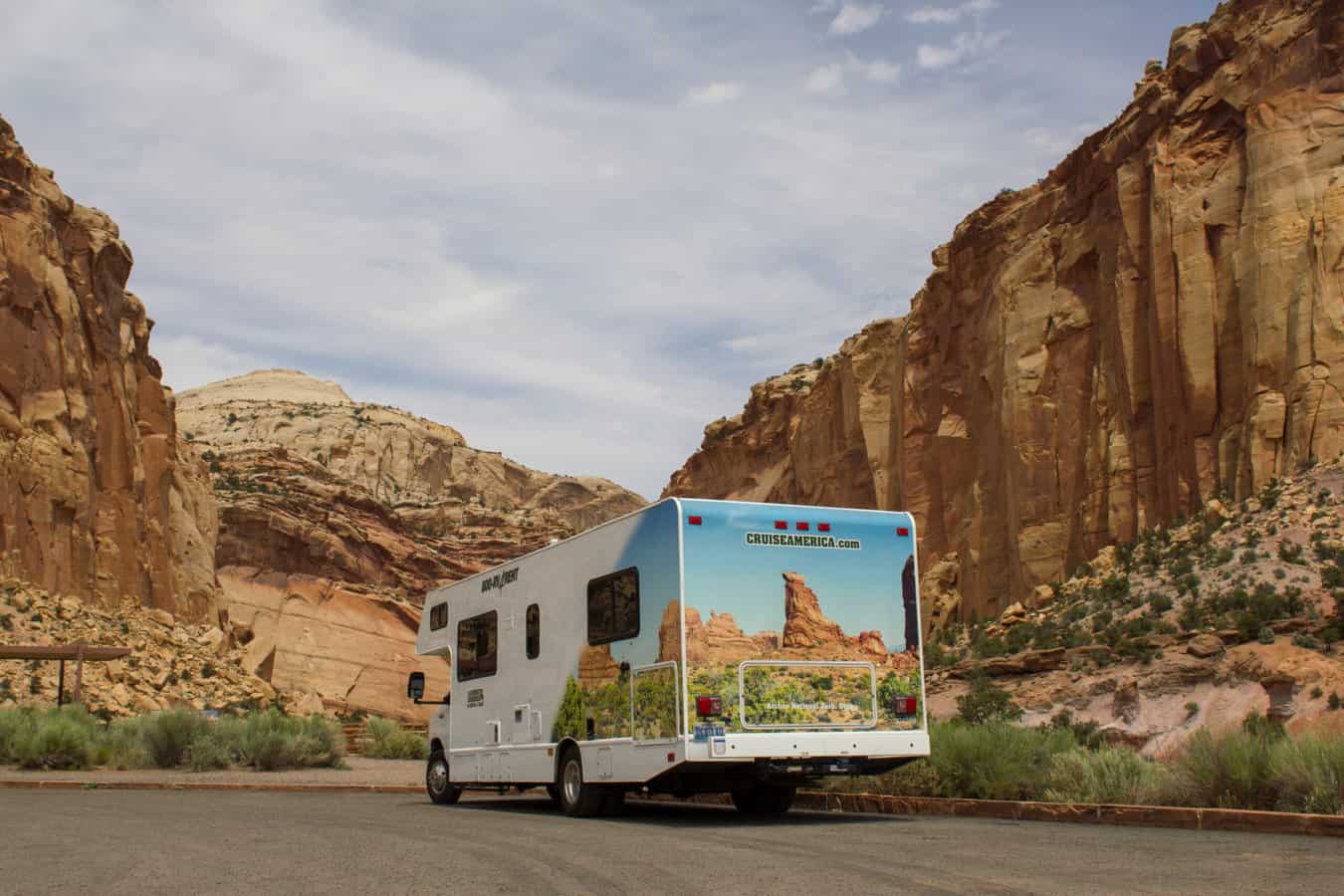
When I was a kid, I learned that to hook up a camp trailer to a ball hitch, you NEED safety chains. Safety chains are pretty essential. But now that I’m using fifth wheels more, I’ve had learn where safety chains belong and where they don’t.
Do fifth wheels require safety chains? Fifth wheels do not need safety chains. The hitch of a fifth wheel uses a kingpin to lock the RV in place. This is the same type of hitch as a big rig and is plenty secure without safety chains.
Fifth wheels have a pretty unique and useful hookup compared to other RV trailers. However, even though fifth wheels don’t need safety chains, there are vehicles that do need them. I’ve included more information about these things below.
Fifth Wheel Hitch vs. Safety Chains
Fifth wheels have a special kind of hitch. In fact, this hitch is where the name “fifth wheel” comes from. And no, it actually has nothing to do with the number of tires on the vehicle.
The hitch on a fifth wheel has two sections: the cargo attachment and the gooseneck hitch. The cargo attachment rests in the truck bed and has a large U-shaped piece that connects with the gooseneck hitch. The gooseneck hitch extends from under the front of the fifth wheel to reach the cargo attachment.
These two pieces are kept in place by the kingpin, which locks into place and holds everything together. It might seem like you’re putting too much trust on a small piece of metal, but it is actually pretty reliable. This kingpin, as mentioned, is also used in big rigs.
The function of these pieces means that there is no need for safety chains. Safety chains are common for ball hitches. They help hold the RV in place.
The problem with safety chains is that they limit the turning range of RVs. They reach from the back bumper of the truck to the front bumper of the RV and lock it all in. When the truck turns, the RV is pulled by the chain as much as the ball hitch, if not more so.
On fifth wheels, the lack of safety chains means that it can pivot a lot more than other RVs. This allows for sharper and wider turns and a smoother ride.
What Are Safety Chains?
Safety chains are, well, metal chains. They’re usually fairly thick and strong, and they are used to connect an RV to a towing vehicle.
Safety chains have a pretty important function. You probably guessed that from the name, considering it has the word “safety” in it, but these chains really do maintain safe travel for towed RVs.
You see, these chains are typically used with ball hitches. Ball hitches are nice in theory, but they can’t work alone.
A ball hitch attaches to the back bumper of your truck, and just as the name suggests, has a piece shaped like a ball that sticks straight up. These hitches can easily stay on a vehicle 24/7, whether or not an RV is being towed. But watch your knees when you walk around the back of your truck.
The RV has a section of the hitch that looks like a hood. This piece is lowered over the ball of the hitch until it completely covers the ball and presses down on the ball and the vehicle. It’s normal to see the truck sink down a bit as the hood is lowered.
The reason the hood needs to press the ball and truck down is that it creates pressure that holds the ball in the hood through travel. So what happens if the hood isn’t pressed down? And if all there is is a tiny ball holding the RV in place, can’t it swing around a lot?
That’s where the safety chains come in.
See, the ball and hood should, in theory, stay together through the whole drive. But if the hood isn’t lowered enough, or if the grease on the ball makes it slip (Yes, it needs grease. Super important for movement actually.), then the hood could come off of the ball.
And if the hood comes off the ball, you then have 99 problems and a runaway trailer is one of them.
Also, if you have a round ball sitting inside a round hood, things are going to move around. Which is exactly what it should do so the trailer can turn, but if you are just trying to go straight and you don’t have safety chains, that trailer could be swinging all over the road behind you.
This causes problems for other drivers who don’t want to be hit by your trailer and also causes problems for you because if the trailer swings drastically, it could pull your truck all over the road too.
Adding the safety chains to the RV hookup gives the RV a way to stay in place while being towed and offers a backup in case there is an issue with the ball hitch. Ideally, you don’t want the chains doing all the work, but they are there to keep the RV attached to the truck in case of emergency.
The chains attach to the truck’s back bumper and the RV’s front one. I’ve seen safety chains that also have a metal L-shaped pole attached. This pole hooks into the RV bumper and then the chain extends to the hitch.
On the hitch, there should be a little hook to hang the chain on, which then swings up and locks the chain in place. Simple as that. I give this explanation on function for one big reason: to demonstrate just how different this hookup is from fifth wheels.
Really, once you get a good look at a fifth wheel, you will be able to see that there is no need for safety chains. The hitch isn’t at the bumper for one thing, and the kingpin locks the gooseneck into place.
Nothing in a fifth wheel hitch just rests on top of anything the way a ball hitch does. It all locks together instead. Because it all locks, there’s much less worry of the hitch sections coming loose from each other, and therefore, no need for safety chains.
When Do You Need Safety Chains?
So, we know that fifth wheels don’t need safety chains. And we know that if RVs have a ball hitch they do need safety chains.
But when should you use safety chains?
Well, safety chains need to be used for any towed RV that isn’t a fifth wheel or something with the big rig type of hitch. This means most camping trailers will fall into this category, along with most horse trailers, toy haulers, etc.
Even those little, uncovered trailers that can hold a single four-wheeler will probably need safety chains. Again, if it uses a ball hitch (trailer hitch, whatever you want to call it), it needs safety chains.
This doesn’t mean you use them only when you go on long drives with your RV. Even if you are just going down the street or around the corner, use the safety chains. It is way better to hook them on and not have them used much than it is to swing the trailer into a passing car or mailbox.
Related Questions
Are there alternatives to safety chains? If you would rather not lug around heavy chains while traveling, there is another option. You can use safety cables instead. These have the same function as safety chains, but are much lighter and are easier to use.
Are safety chains required on trailers? Most trailers do need safety chains. It depends mostly on whether or not you have a ball hitch. If you do, then you absolutely need safety chains or cables to keep the trailer from swinging and swaying.




There’s a huge problem in Northern California that is never mentioned in blogs about using chains. My county has lots of highway users towing firewood loads, as well as camping and boat trailers. Hitching CHAINS, if not used correctly or the trailer hitch is wrong, can drag on pavement causing SPARKS THAT IGNITE WILDFIRES. This happens several times each year! These wildfires CAN CAUSE MORE DEATHS, as well as property damage, than other types of reckless driving. I’ve never hitched up a trailer, but reading about it shows how complex and tricky it can be. I think law enforcement and DMVs should require training.
Harley, you are absolutely correct. Also, though many hitches have a place where you CAN hook the chains, they are supposed to be hooked to the tow vehicle, NOT to the hitch. The brake cable too. As a MN State Patrol certified vehicle inspector, I’ve seen many examples of a trailer laying in the ditch, safely chained to the hitch that broke off the truck.
Wow… just wow. The amount of ignorance here is scary. Jim harmer needs some schooling in towing and the fact he has owned Rvs and pull all the time is terrible. Safety chains are NOT used the way they are described here. The chains are NOT used to keep a trailer straight going down the road, NOT for pulling a trailer through turns and the trailer coupler does NOT just sit on the ball. Smh. The coupler actually has a locking mechanism which secures it to the ball. Chains are required because people are stupid and dont always hitch trailers correctly, as jim has clearly demonstrated here. If your chains are being pulled on AT ALL while towing, your chains are too short. The chains should allow plenty of room for the trailer to fully pivot and turn without binding. They are there to keep the trailer connected in the event that a stupid person does not hitch the trailer correctly. As to why saftey chains are not required, the law believes that the 5th wheel hitch is secure enough that it needs no SAFETY chains. Though, you can buy and use safety chains on a 5th wheel, various retailer’s carry 5th wheel specific safety chains and if you’re someone like Jim I hope for your safety and everyone else’s you get some and use them.
Lol @ Harley!! I just read this article and was in disbelief. It is frightening to know that there are yahoo’s out there towing trailers down the highway that could be following this advice!